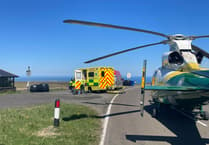Manx children’s charity Isle of Play is a year old.
The charity, which encourages children to go outside and play, was set up in May 2018, in response to the dwindling numbers of children playing outdoors.
Isle of Play chief executive Chris Gregory said: ’We started with nothing other than some enthusiastic people and an idea. To reach this milestone is amazing.
’To be supported by the public the way we have has shown that what we are doing is valued by both children and their families.’
This year Isle of Play has seen 12,000 children access its services through their two main projects, Forest School and PlayingOut
Forest School operates term time, bringing classes of school children on a weekly visit to a local woodland environment.
Here the children are given the freedom to access tools, climb trees, build dens, light fires, cook their own food and create their own play. More than 250 children regularly attend Forest School each week from a variety of the Island’s schools.
Throughout the holidays the Isle of Play team travels the island delivering their mobile playscheme ’PlayingOut’.
Mr Gregory added: ’Having studied children and their play habits for close to 20 years, it is abundantly clear to me that there has been a significant decline in the number of children actively engaging in outdoor play.
’We see fewer children calling for their friends and going out independently to play without the supervision of adults.
’For many children, play has become a scheduled activity that is all too often restricted to schools and the homes.
’Street play has all but vanished due to the very real threat of traffic.’
He suggested that the rise in secure fenced play areas in parks with standard equipment partially contributed to the problem. These designated areas shout ’play here but not elsewhere’, he said.
Mr Gregory said: ’As fewer children are seen playing, climbing trees, building dens then adults become less familiar with the sight and sound of free play and sometimes react against it.
’We are not anti-parks and play areas - they work well for parents of small children and keeping areas free of dog mess etc - but often they don’t stimulate imaginative, creative risk-taking play that should be at the core of a playful childhood.’
He said that ’real play’ rarely involves an adult supervising.
’Play is intrinsically motivated, undirected and done for no external goal other than the sake of the play itself,’ Mr Gregory said.
’It requires environments which are flexible and accommodates for the spontaneity that makes children’s play such a defining behaviour.’
He said the team often heard from parents and others who had grown up on the Isle of Man, telling stories of growing up here.
Those tales included exploring the nooks and crannies of neighbourhoods, getting into ’scrapes’, discovering secrets, developing friendships and learning the potential of the world around them and being so familiar with their local area.
That familiarity formed the basis for a lifelong love of the area they grew up in.
Mr Gregory added that neuroscience has shown just how integral play is to the development of the brain.
During the formative years of childhood, play helps form new neural pathways throughout the brain. In fact, the more we play the bigger the brain gets.
’Play cultures life lessons that can’t be taught in a classroom,’ he said.
’Through play we learn how to make friends, manage risk and develop the skills that make us resilient, more capable of recovery and less likely to be affected by mental illness.
’Play allows children to be physically active, climbing trees, riding bikes and playing chase games all increase the heart rate and develop muscle growth.
’It’s no coincidence there were fewer obese children 30 years ago, children were outside playing, not sitting catatonic in front of screens.
’We strongly believe that the decline of children’s play is detrimental to the island’s children and that is why we formed Isle of Play.
’To promote and provide opportunities for children to play; to bring play back to every child’s doorstep and recognise that children are active participants in our community and have a right to play.
Delivering two sessions a day at different venues around the island and supported by Manx Gas, more than 7,000 children attended in just 11 weeks, filling parks and playgrounds with children and their families enjoying themselves.
Jennie Costain from Manx Gas said: ’We are really impressed with the passion and dedication which Chris and his team have for the wellbeing of the children on our island.
’As adults we were the generation who did play out and it is heart-warming to see today’s children getting the chance to do the same. Manx Gas is very proud to be involved with this charity and help support the community.’
In the next few weeks Isle of Play will be opening ’Lester’s Yard’, the island’s first adventure playground.
Open every day after school, the facility, in Ballaughton Park Douglas, will give children the freedom to develop their own playground, to build dens and develop the space as they would like.
Over the next year, as well as continuing to deliver services, Isle of Play plans to increase their advocacy work; developing policy and working with communities to increase the opportunities for children to access play on their doorsteps.
To find out more about Isle of Play and how families and sponsors can get involved visit isleofplay.im and follow them on social media.


.jpeg?width=209&height=140&crop=209:145,smart&quality=75)


Comments
This article has no comments yet. Be the first to leave a comment.